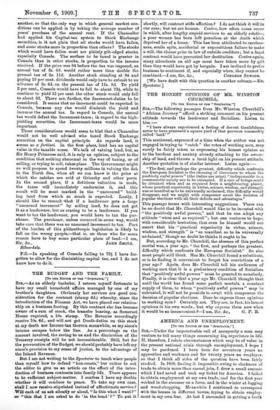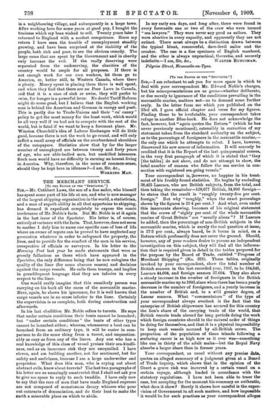AMERICA AND UNEMPLOYMENT.
[To THE EDITOR OP VII " SPECTATOII.1
SIR,—Under the impenetrable veil of anonymity a man may venture to tell many things concerning hia experience in life. If, therefore, I relate circumstances which may be of value in the present national crisis through unemployment, I hope I may be pardoned. I have been for seventeen years an apprentice and workman and for twenty years an employer, so that I think all sides of the question have been fairly studied. In 1868, finding it impossible owing to slackness of trade to obtain more than casual jobs, I drew a small amount which I had saved and took my ticket for America. I failed to obtain employment at my own trade, and for the first year worked in the summer on a farm, and in the winter at logging and wood-chopping. Meanwhile I continued to correspond with the bosses in different towns, trying to obtain employ- ment in my own line. At last I succeeded in getting a berth in a neighbouring village, and subsequently in a large town. After working here for some years at good pay, I bought the business which my hose wished to sell. Twenty years later I returned to England with a modest competence. Since my return I have seen the trouble of unemployment steadily growing, and have been surprised at the inability of the people, both rich and poor, to see the obvious remedy. The large sums that are spent by the Government and in charity only increase the evil. If the really deserving were separated from the undeserving, the charities of the country would be ample for all purposes. If there is not enough work for our own workers, let them go to America, or, better still, to Western Canada, where there is plenty. Money spent in placing them there is well spent, and when they find that there are no Poor Laws in Canada, Ind that it is a case of sink or swim, they will prefer to swim, for hunger is a powerful lever. No doubt Tariff Reform might do some good, but I believe that the English working man is behind the American and German in energy and push. This is partly due to Trade-Unions and their "Ca' canny" policy to get the most money for the least work, which would be all very well if we had not to compete with the rest of the world, but is fatal if we want to keep a. foremost place. Mr. Winston Churchill's idea of Labour Exchanges will do little good, because there is not the work to go round, and will only inflict a small army of officials on the overburdened shoulders of the ratepayers. Statistics show that by far the larger number of unemployed are between twenty and forty years of age, who are able-bodied men, but unskilled labourers. Such men would have no difficulty in earning an honest living in America. Why, therefore, in the name of common-sense, should they be kept here in idleness P—I am, Sir, Ste.,
WORKING MAN.































































 Previous page
Previous page